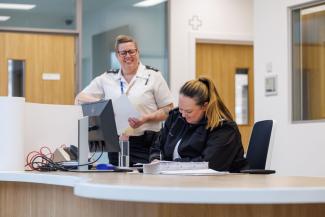The role of the Psychologist in the SPS is both diverse and dynamic. Whilst there are a range of core tasks that underpin the role, the nature of the work and those we work with are such that very rarely are any two days the same.
Our Forensic Psychologists provide a wide variety of services, including consultation, case management, risk assessment, offending behaviour interventions (development, delivery, supervision, treatment management and evaluation), psychological therapies, staff training and research.
There are five specific Psychology roles within the service: Assistant Psychologists, Forensic Psychologists in Training, Practitioner Psychologists, Principal Psychologists and Consultant Psychologists.
